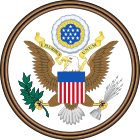Aldrich–Vreeland Act facts for kids
 |
|
| Other short titles | National Bank Circulation Act of 1908 |
|---|---|
| Long title | An Act to amend the national banking laws. |
| Nicknames | National Bank Laws Amendment of 1908 |
| Enacted by | the 60th United States Congress |
| Effective | May 30, 1908 |
| Citations | |
| Public law | Pub.L. 60-169 |
| Statutes at Large | 35 Stat. 546 |
| Codification | |
| Titles amended | 12 U.S.C.: Banks and Banking |
| U.S.C. sections created | 12 U.S.C. ch. 2 § 104 |
| Legislative history | |
|
|
The Aldrich–Vreeland Act was a United States law passed in 1908. It was created to help the country's money system after a big financial problem in 1907, known as the Panic of 1907. This act also set up a special group called the National Monetary Commission.
Contents
What the Act Did
The Aldrich–Vreeland Act allowed national banks to form groups called "national currency associations." These groups had to have at least ten banks and a total of $5 million. Their main job was to print and give out emergency money.
Emergency Money Rules
This emergency money was special. It could be backed by not only government bonds but also by almost any other valuable items the banks owned. Before this money could be given out, it had to be approved by the leaders of the national currency associations. The Comptroller of the Currency then distributed it.
Why Emergency Money Wasn't Used Much
There was a tax on this emergency money. For the first month it was used, there was a 5 percent tax. This tax went up by 1 percent each month after that. Because of this tax, banks might not have wanted to use the emergency money. Another reason it might not have been used much is that it simply wasn't needed very often.
How the Law Was Passed
The bill for this act was introduced by Representative Edward B. Vreeland from New York. Senator Nelson W. Aldrich from Rhode Island also played a big part in creating the law.
Votes in Congress
The bill passed in the House of Representatives on May 27, 1908. Most Republicans voted for it, and most Democrats voted against it. On May 30, it passed in the Senate. President Theodore Roosevelt signed the bill into law on the same night.
Impact and Changes
The Aldrich–Vreeland Act was important because it gave the country a way to deal with money problems.
World War I and Emergency Funds
In 1914, when World War I started, there was a big financial panic around the world. The New York Stock Exchange even had to close. At this time, the Aldrich–Vreeland Act was used. The Secretary of the Treasury, William Gibbs McAdoo, announced that plenty of emergency money was ready for banks to use. This helped calm the public.
Replaced by the Federal Reserve
The law was changed and extended in 1914. However, a new law called the Federal Reserve Act was passed in December 1913. This new act created the Federal Reserve System, which is still our country's central banking system today. When the 12 regional Federal Reserve banks opened in November 1914, the emergency money from the Aldrich–Vreeland Act was no longer needed and was taken out of use.
See Also
- Federal Reserve Act
- Panic of 1907
- National Monetary Commission

